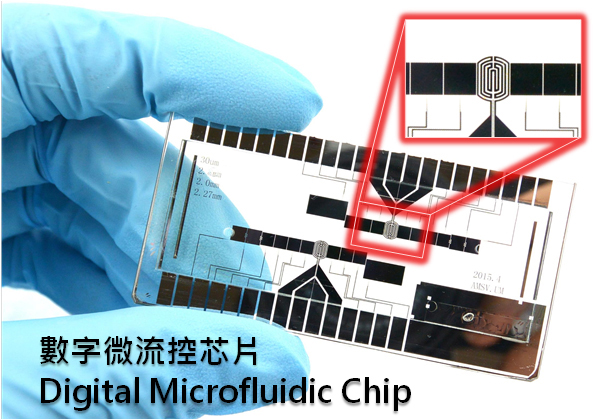The University of Macau’s (UM) recently published a paper in Lab on a Chip, a journal published by the Royal Society of Chemistry in the United Kingdom. The paper discusses a novel method that can shorten the duration of DNA melting curve analysis to less than seven seconds. This is another breakthrough in UM’s microchips research.
The paper from UM’s State-Key Laboratory of Analog and Mixed-Signal VLSI is titled ‘Sub-7-second Genotyping of Single-nucleotide Polymorphism by High-resolution Melting Curve Analysis on a Thermal Digital Microfluidic Device’. It discusses a novel thermal digital microfluidic (T-DMF) device which enables precise thermal modulation and pipelined measurement of multiple samples. Ultrafast DNA melting curve analysis was achieved impressively in less than seven seconds, while keeping the resolution adequate for single-nucleotide discrimination on the device.
The paper is co-authored by UM doctoral student Chen Tianlan, Dr Jia Yanwei, doctoral students Dong Cheng and Gao Jie, Prof Elvis Mak Pui In, and Vice Rector Prof Rui Martins. The research was funded by the Macau Science and Technology Development Fund.
The thermal digital microfluidic (T-DMF) device enables ultrafast DNA melting curve analysis (MCA). Within seven seconds, the T-DMF device succeeded in differentiating a melting point difference down to 1.6 °C with a variation of 0.3 ̊C in a tiny droplet sample (1.2 μL), which is 300 times faster and 20 times less sample spending, than the standard MCA (35 minutes, 25 μL) run in a commercial qPCR machine. Such a performance makes it possible for a rapid discrimination of single nucleotide mutation, relevant to prompt clinical decision-making. Also, aided by electronic intelligent control, the T-DMF device facilitates sample handling and pipelining in an automatic serial manner. An optimised oval-shaped thermal electrode is introduced to achieve high thermal uniformity. A device-sealing technique averts sample contamination and permits uninterrupted chemical/biological reactions. Simple fabrication using a single chromium layer fulfils both the thermal and typical transport electrodes. Capable of thermally-modulating DNA samples with ultrafast MCA, this T-DMF device has the potential for a variety of life science analyses, especially for disease diagnosis and prognosis.
Source: Communications Office
Media Contact Information:
Communications Office, University of Macau
Albee Lei Tel:(853) 88228004
Kelvin U Tel:(853) 88224322
Email:prs.media@um.edu.mo
UM Website:www.umac.mo

